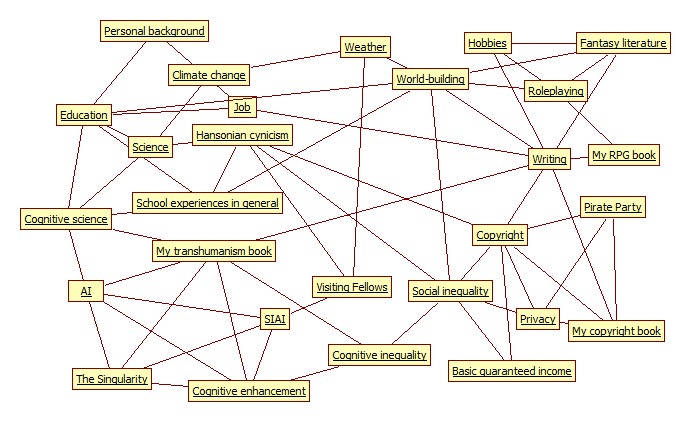One of the things that makes Michael Vassar an interesting person to be around is that he has an opinion about everything. If you locked him up in an empty room with grey walls, it would probably take the man about thirty seconds before he'd start analyzing the historical influence of the Enlightenment on the tradition of locking people up in empty rooms with grey walls.
Likewise, in the recent LW meetup, I noticed that I was naturally drawn to the people who most easily ended up talking about interesting things. I spent a while just listening to HughRistik's theories on the differences between men and women, for instance. There were a few occasions when I engaged in some small talk with new people, but not all of them took very long, as I failed to lead the conversation into territory where one of us would have plenty of opinions.
I have two major deficiencies in trying to mimic this behavior. One, I'm by nature more of a listener than speaker. I usually prefer to let other people talk so that I can just soak up the information being offered. Second, my native way of thought is closer to text than speech. At best, I can generate thoughts as fast as I can type. But in speech, I often have difficulty formulating my thoughts into coherent sentences fast enough and frequently hesitate.
Both of these problems are solvable by having a sufficiently well built-up storage of cached thoughts that I don't need to generate everything in real time. On the occasions when a conversations happens to drift into a topic I'm sufficiently familiar with, I'm often able to overcome the limitations and contribute meaningfully to the discussion. This implies two things. First, that I need to generate cached thoughts in more subjects than I currently have. Seconds, that I need an ability to more reliably steer conversation into subjects that I actually do have cached thoughts about.
Below is a preliminary "conversational map" I generated as an exercise. The top three subjects - the weather, the other person's background (job and education), people's hobbies - are classical small talk subjects. Below them are a bunch of subjects that I feel like I can spend at least a while talking about, and possible paths leading from one subject to another. My goal in generating the map is to create a huge web of interesting subjects, so that I can use the small talk openings to bootstrap the conversation into basically anything I happen to be interested in.

This map is still pretty small, but it can be expanded to an arbitrary degree. (This is also one of the times when I wish my netbook had a bigger screen.) I thought that I didn't have very many things that I could easily talk with people about, but once I started explicitly brainstorming for them, I realized that there were a lot of those.
My intention is to spend a while generating conversational charts like this and then spend some time fleshing out the actual transitions between subjects. The benefit from this process should be two-fold. Practice in creating transitions between subjects will make it easier to generate such transitions in real time conversations. And if I can't actually come up with anything in real time, I can fall back to the cache of transitions and subjects that I've built up.
Naturally, the process needs to be guided by what the other person shows an interest in. If they show no interest in some subject I mention, it's time to move the topic to another cluster. Many of the subjects in this chart are also pretty inflammable: there are environments where pretty much everything in the politics cluster should probably be kept off-limits, for instance. Exercise your common sense when building and using your own conversational charts.
(Thanks to Justin Shovelain for mentioning that Michael Vassar seems to have a big huge conversational web that all his discussions take place in. That notion was one of the original sources for this idea.)